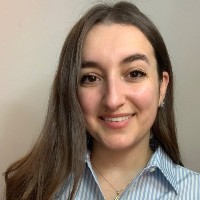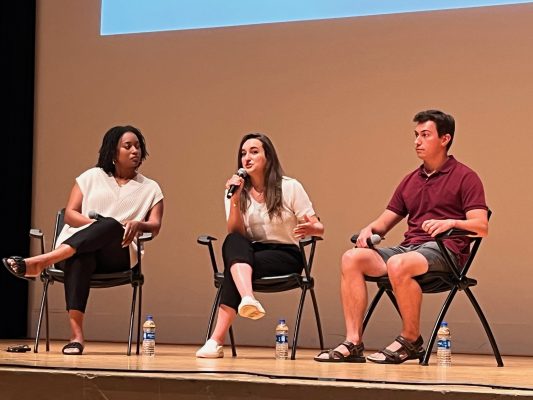Yousr Dhaouadi: Ph.D. Candidate, GSO President Willing to ‘Follow Every Opportunity’
Yousr Dhaouadi is a Ph.D. chemical engineering candidate in the Department of Biomedical and Chemical Engineering in the College of Engineering and Computer Science who plans to complete her program in summer 2023. She’s currently finishing a second term as president of the Graduate Student Organization (GSO), previously having served as GSO comptroller and financial secretary. Dhaouadi is also in her second term as the graduate student representative to the University’s Board of Trustees. She’s participating in an ex officio capacity on the Board’s Academic Affairs and Enrollment and Student Experience Committees and is also now a member of the Academic Strategic Plan Research and Creative Excellence Working Group.
Discover what motivates Dhaouadi and how she likes to have as many others involved in leadership initiatives as possible, as well as what she might do next once she completes her program.
-
01Can you tell us about your academic background?
I’m now in my fifth year of my doctoral program. I am originally from Tunisia and moved to Syracuse in 2015 as a transfer student from the American University of Sharjah in the United Arab Emirates (UAE). I originally entered the chemical engineering program here after three years in the UAE, then graduated from Syracuse in 2017. I worked at Crouse Hospital in Syracuse as a medical scribe in the emergency department for a year after that. I enrolled in the Ph.D. program in chemical engineering in 2018.
-
02What was attractive to you about this Ph.D. program at Syracuse?
I did part of my senior year in the same lab where I am currently doing my doctoral research, when I met my advisor, Dr. Dacheng Ren [associate dean for research and graduate programs and Stevenson Endowed Professor of biomedical and chemical engineering]. I’m here because of him and his vision for this project. I hadn’t considered graduate school as a future before that; I was still contemplating what to do next while working at Crouse. He motivated me to eventually come to graduate school by presenting me with a new opportunity. So, I thought, ‘Why not? I love taking on new adventures!’ That’s why I think advisors are very important in helping students shape their futures.
-
03How have you enjoyed your time in the United States and at Syracuse University?

Yousr Dhaouadi, fifth-year Ph.D. student
I really enjoy the U.S., especially from the aspect of the freedom to generate ideas and freedom of expression. I came from the Middle East, and you do have freedom of idea expression in that region within certain bounds and limits of the society and community, but it doesn’t compare to what you have over here. That is a concept that I think heavily impacts people’s personalities and that heavily impacts what they end up doing in life.
When I first moved here, I found a lot of different communities in both my undergrad and graduate years and places to express my personality, so I didn’t feel that I wasn’t acting like myself. But you have to actively and proactively look for those avenues. I did that, so it took me a few months to feel homesick. I think sometimes you have to feel uncomfortable to get comfortable, and I’ve experienced that several times.
-
04Can you describe your research and what you hope to discover?
I’m conducting research on understanding persister cells residing in biofilms and their involvement in the resistance of chronic bacterial infections. The small sub-population of persister cells actually accelerates the development of antibiotic resistance. The cells I study have quite interesting behavior and much is yet unknown about them. My hope is to study why they behave as they do to develop solutions to combat antibiotic resistance. I’m actually trying to make the cells and create a system that makes it that much easier to study them.
-
05Why did you become involved in student government leadership and in representing other graduate students?
A student in my lab who was involved in GSO (Sweta Roy, who previously served as GSO external vice president) introduced me to the organization during my first year of graduate school. I got to meet a diverse population of students from other departments. They were talking about things we all have in common regarding graduate student life. It was empowering and insightful to hear the different perspectives from across the different departments.
You can be in such a bubble in graduate school. If you’re experiencing trouble, that can sometimes be a bad thing if it makes you feel negative and with no way out. But if you’re seeing someone from another school or college experiencing the same things, it brings a refreshing perspective and a positive energy and mindset to what is going on. With my personality I also felt like there are a lot of ways I can give back. I have been involved in leadership roles in every school or university I’ve been to, and I wanted to bring the organizational aspects of my personality to something that could maybe benefit from it here at Syracuse.
-
06How do you describe your participation traits and leadership style?
I initially never went for the president position for any organization I joined. I’d go for the roles that were nitty-gritty because I felt I could get those things done. As the opportunities presented themselves, I would challenge myself to go for it. As for my style, I prefer not to do everything on my own; I like to provide the avenue and the resources for other students to do as much as they can. I truly believe in the power of numbers. When there are a lot of students involved, we can grow our organization and benefit from a diverse pool of talents.
Having as many players as possible involved is the way to have the biggest impact in the community. The role of president does have a leadership tag to it, but having the workload fall on one person’s shoulders is never efficient or effective. I’d rather have as many students as possible willingly put themselves in these leadership roles.
I also live by the following Maya Angelou quote, that people will forget what you said, they’ll forget what you did, but they will never forget how you made them feel. That definitely drives how I make my decisions and how I think about the work I have to do. You’re always working with people and that always needs to be considered in high regard.
-
07What are some of the initiatives you’ve been involved in with GSO?
There’s been a great increase in participation. Last year we added four new seats to the GSO Senate because we had more Senate candidates apply than we had seats for. We filled 50 academic program seats while there had only been 30 or so before. We’ve had a lot of student participation in our town hall meetings; 50 or 60 attended this year, a record attendance.
We’ve worked on student advocacy programs around campus. Examples are our diversity committee and their efforts to make sure menstrual products are free of charge, and our Climate Action Committee collaboration with the undergraduate Student Association to widen participation.
We’ve also looked at stipend levels for Ph.D. students, including funding their research work over the summer. We successfully advocated for 43 new summer fellowship awards this past summer alongside the Graduate School. Quality work comes from students who have a healthy and balanced mindset, and we all know nowadays that finances are a big stressor for everyone, regardless of the jobs they are in. It’s been important to look at the annual stipend as realistic for the cost of living around campus. It’s important to make sure that students don’t have to worry about finances and doing their graduate work at the same time.

Yousr (center) participating in this fall’s graduate student welcome panel with fellow graduate students Chelsie Bouldin (left) and Salvatore (Sal) Zarella.
-
08What would you like the University community to recognize regarding graduate students here?
That graduate students play many different roles and how valuable and fundamental they are on campus. They conduct research that is vital to the University’s research reputation. They work with Food Services, the Department of Public Safety and the Parking and Transportation Services team. They are also teaching, some as lead class instructors or teaching assistants. So, you really have graduate students involved in every single aspect of the University’s operations in some sense.
The reason you have these students is that they really do care about being here. Yes, they do want to get their degrees, but they also want to do a lot more than just that. I think that comes from the post-COVID era, where students want a greater sense of purpose beyond their academic focus. I think the high turnouts we’ve been having for volunteer GSO Senate and leadership positions show that students really do want to have a role beyond their immediate coursework or research.
-
09What do you want to contribute as student representative on the Academic Strategic Plan’s Research and Creative Excellence working group?
I believe that the school is really looking at what we do well in research and wants to make sure we continue to do that, and it is also looking at what can we do better or what we don’t do enough of.
We say that we are “conducting research,” and for many students that’s hours of sitting at a desk writing or being at a bench working on an experiment. I want to make sure that there are realistic expectations as to what can be achieved and that the resources needed to do those things are available. That includes having the equipment, having techniques available and accessible, and providing training for students to use equipment. I hope that I can be a voice for my experience in the lab, reporting the things that were hard for me to do with the resources I had. Hopefully, we can pour more resources into several areas around campus. It would help not just STEM disciplines but other programs—history, religion and so on. We need to get feedback from many areas as to what is needed.
-
10What are your plans following graduation?
I’m leaning towards a postdoctoral fellow position at a university and then teaching as a chemical engineering professor. I really like the kind of work done at the administrative level in higher education, too, so I would love to find a leadership role. I also like the research aspect of my work, so perhaps working in research and development for a pharmaceutical company. Maybe I’d open my own lab. I never really pin down a future. I like to follow every single opportunity that comes to me. I like to lead but I also like to produce a lot of good work. Geographically, I’d probably want to limit my search to the Northeast since I’m currently engaged, and my fiancé is based in Manhattan.
For more info, Click Here.

